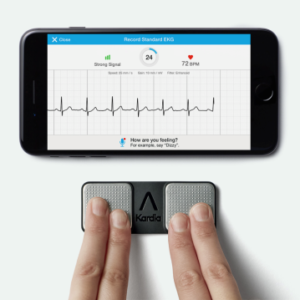Wednesday 12 July 2017
Health professionals across London today have access to a brand new, online Atrial Fibrillation (AF) Toolkit, improving the detection and treatment for the estimated 68,000 people in the capital at risk of an AF-related stroke.
The Atrial Fibrillation Toolkit has been designed by a team of experts, including Imperial College Health Partners, to help address one of the biggest burdens on the NHS and the health of the population. It brings together the latest clinical guidance, performance data, case studies and support for clinicians and commissioners.
Tackling the risk
Atrial Fibrillation (AF) is the most common cardiac arrhythmia and is a major risk factor for stroke; contributing to 1 in 5 strokes and associated with a 20% increased likelihood of mortality. An estimated 68,000 people in London are living with undetected AF and at risk of blood clots, stroke, heart failure and other heart-related complications. The risk of a stroke for people with AF can be substantially reduced by detecting and diagnosing the condition, and providing effective anticoagulation to prevent the formation of clots in the heart. Despite this, up to 25 percent of known people diagnosed with AF are not appropriately anticoagulated. Aside from the clinical risks, it is estimated that stroke care costs the NHS £2.8 billion in direct care each year.
What’s included
A London-wide partnership of the three London Academic Health Science Networks, the London Clinical Networks and AF charities is working to tackle these issues through better detection and treatment using evidence-based interventions. This includes the creation of the Atrial Fibrillation Toolkit; an online interactive resource, which includes examples of best practice under the three themes: DETECT, PROTECT and PERFECT. Containing case studies and exclusive resources, the toolkit includes:
- An extensive review of mobile detection technology, including single lead ECGs
- The AF improvement cycle – developed to provide clinicians and commissioners with a clear process to follow when deciding on and developing improvements in AF care
- Clear, concise infographics for each London Clinical Commissioning Group outlining its latest performance data under the themes of DETECT, PROTECT and PERFECT
- Nine opportunity areas for improving the detection, treatment and ongoing management of AF, supported by case studies and practical tools
- Anticoagulation myth busters
- Anticoagulation adherence support for patients.
Tony Rudd, National Clinical Director for Stroke at NHS England, said:
“This toolkit provides information and support for those commissioning services for and treating people with AF. With so many Londoners estimated to have undiagnosed AF, the toolkit will enable commissioners and clinicians to lead the way, showing that correct management of AF is simple to deliver and prevents a huge amount of suffering for individuals and their families, avoiding an unnecessary burden on our health service.”
Working in partnership
Partner organisations in London are working with colleagues through the AHSN Network to make the Atrial Fibrillation Toolkit available to healthcare professionals, commissioners and clinical networks across the country. Download the toolkit.
The toolkit has been a collaboration of the three London Academic Health Science Networks (Health Innovation Network, Imperial College Health Partners and UCLPartners), the London Clinical Networks and charities. The partnership seeks to avoid the debilitating effect of strokes by detecting AF and treating people using evidence-based innovations, whilst also making savings within the NHS and social care
- Read more about the work of ICHP and AF
- Follow the conversation online: #AFToolkit.



